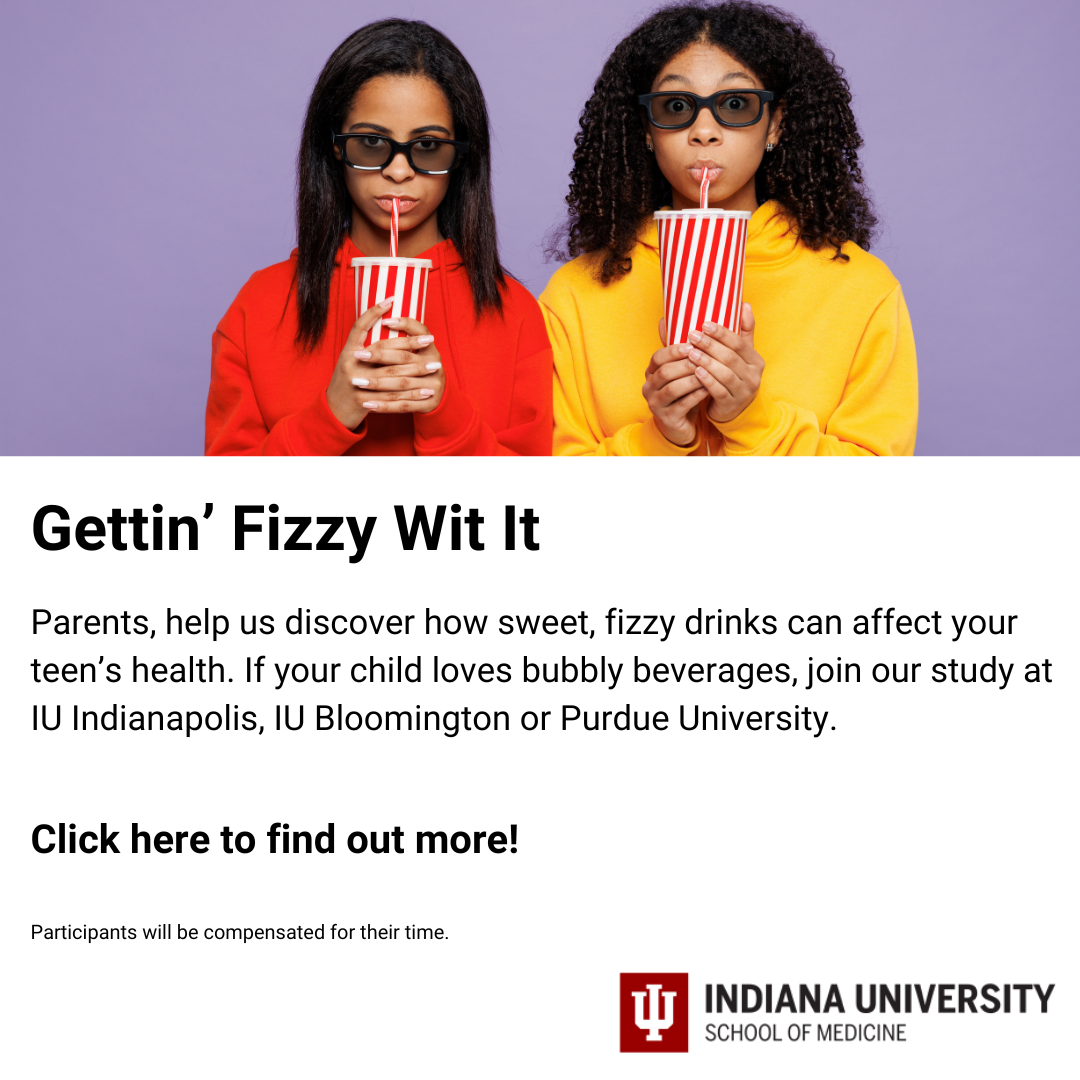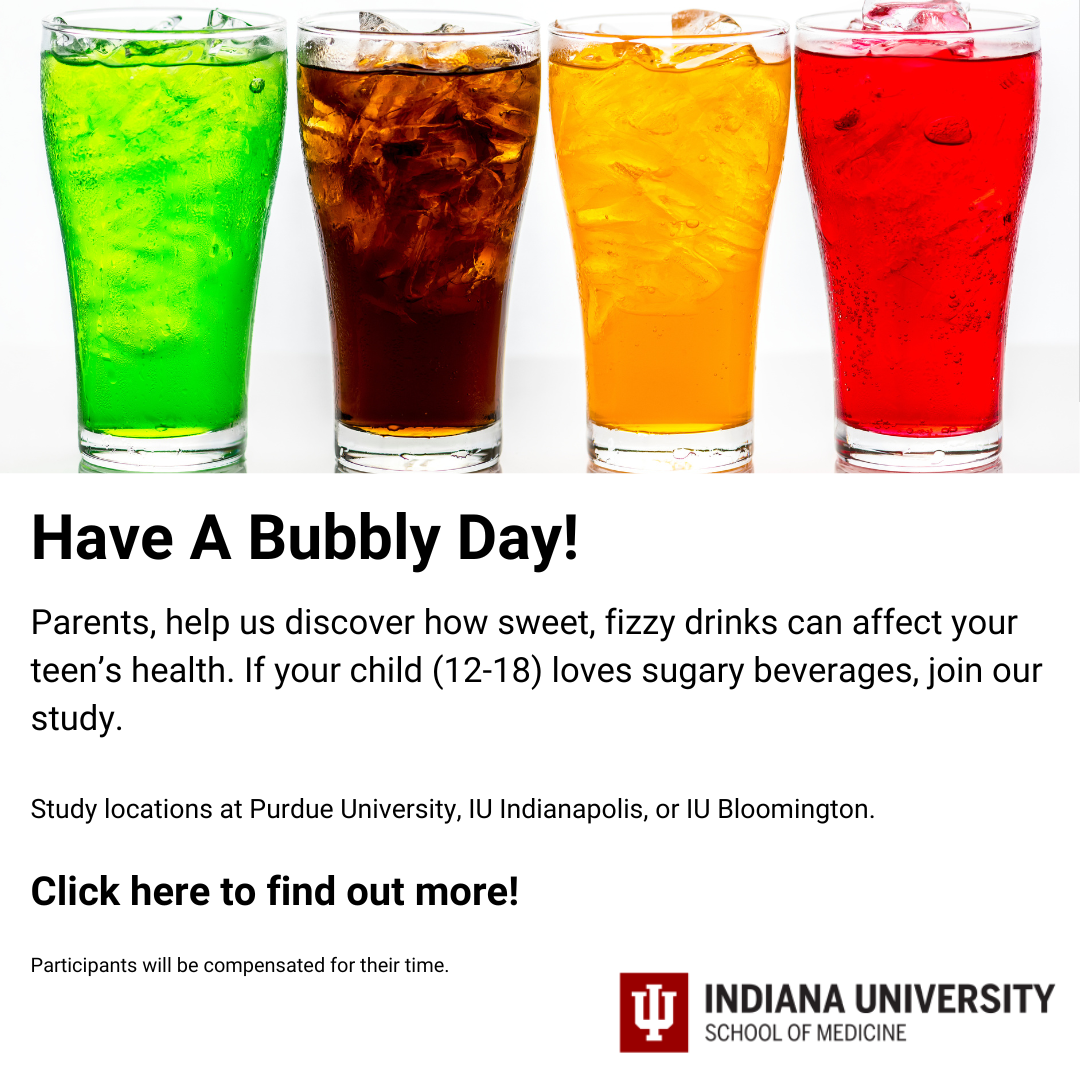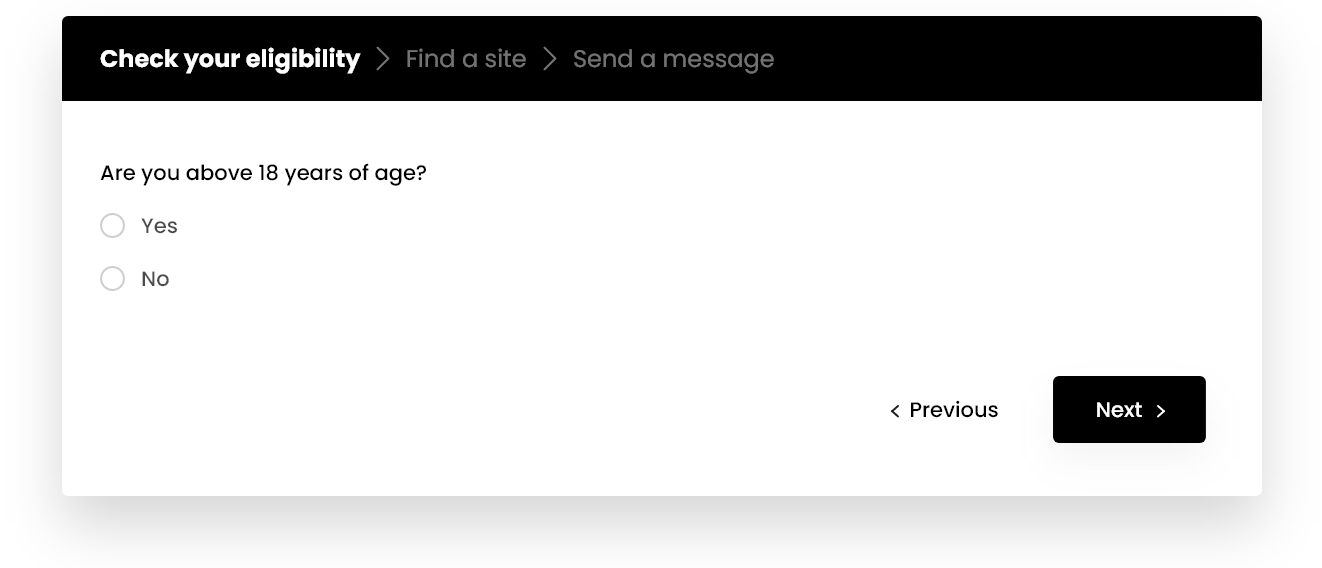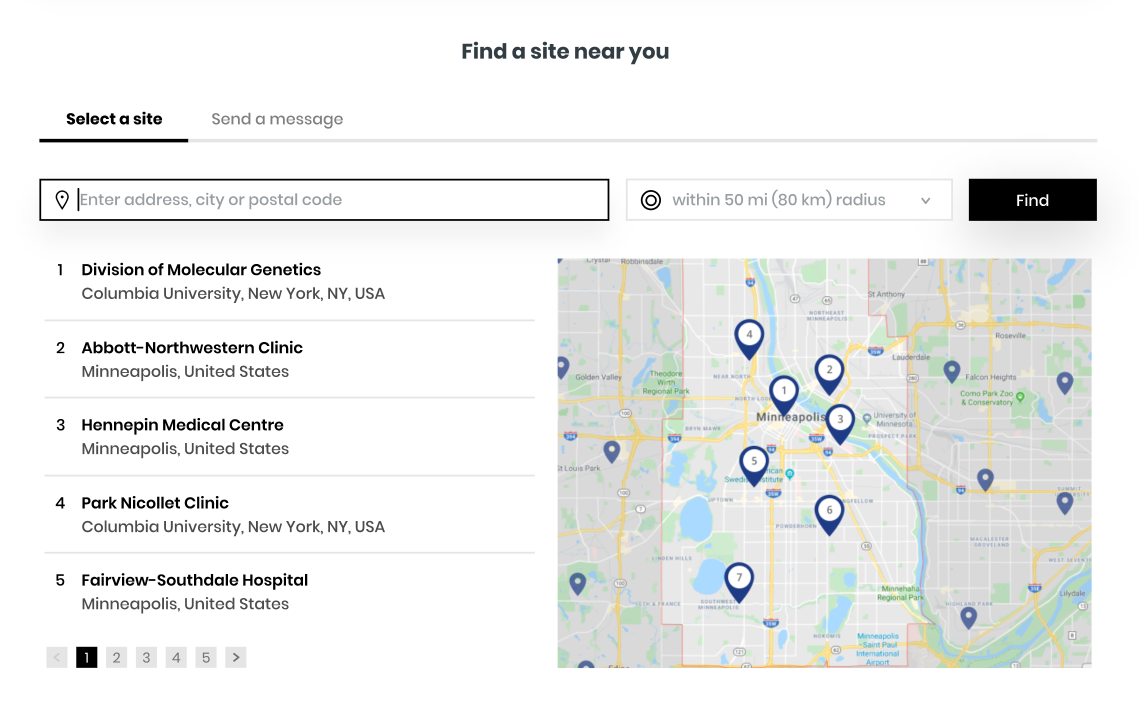
Health and sugary drinks
We explore how swapping sugary drinks may improve health in teens.

Why is this study being done?
The goal of this study is to better understand how preferences for sweet flavors affect dietary habits, heart and metabolic health.
Who can take part?
We are looking for adolescents (ages 12-18) who consume sugary sodas and their families (only one parent/guardian can participate). Participants must also be able to attend study visits at the Clinical Research Centers at IU Indianapolis or IU Bloomington or Purdue University West Lafayette.

We explore how swapping sugary drinks may improve health in teens.

This study matters because cutting sugary drinks can improve health and prevent disease in vulnerable youth.

This study explores how replacing sugary sodas with unsweetened or reduced-sugar sparkling waters can help improve health in adolescents who prefer sweet drinks.
What is the relationship between Health and sugary drinks?
The relationship between health and sugary drinks is that consuming too many sugary drinks—like sodas, sweetened teas, and energy drinks—is linked to serious health problems. These beverages are high in added sugars and calories but do not give nutritional value. Over time, regularly drinking them can lead to:
IReducing sugary drink consumption in adolescents is important because they are at higher risk for obesity and related diseases
What causes Obesity?
Obesity is caused by an imbalance between the calories you consume and the calories your body uses. When you take in more energy (calories) than you burn, the excess is stored as body fat. Over time, this can lead to obesity.
Here are the main causes of obesity:
Unhealthy Diet: Eating foods and drinks high in added sugars (like sugary beverages), unhealthy fats, and refined carbs increases calorie intake without providing other nutrients.
Lack of Physical Activity: A sedentary lifestyle—too much sitting and not enough movement—means fewer calories are burned.
Genetics: Some people have genes that make them more likely to gain weight or store fat differently.
Environment: Easy access to high-calorie foods, limited places for physical activity, and busy lifestyles can lead to weight gain.
Psychological Factors: Stress, emotional eating, and lack of sleep can contribute to overeating.
Medical Conditions & Medications: Some health conditions (like hypothyroidism) and certain medications can lead to weight gain.
How is Obesity treated?
Obesity is treated by making long-term changes to diet, physical activity, and lifestyle habits. The main focus is on eating healthier foods, reducing added sugars (especially from sugary drinks), and increasing daily physical activity. In some cases, healthcare providers may recommend medical treatments like weight-loss medications or surgery. Support from healthcare professionals, family, and community programs can also help people maintain a healthy weight and improve their overall health.
More information about Obesity
Centers for Disease Control and Prevention (CDC)
Childhood Obesity Page: Link
Provides statistics, causes, consequences, prevention strategies, and resources for parents and healthcare professionals.
American Academy of Pediatrics (AAP)
Recommendations and Resources on Obesity:Link
Information for healthcare providers and families on preventing and treating childhood obesity.
National Institutes of Health (NIH) – National Institute of Diabetes and Digestive and Kidney Diseases (NIDDK)
Childhood Obesity Information Page:Link
Provides details on childhood obesity, including causes, treatments, and clinical trials.
Let’s Move! Initiative (Archived):Link
A former national initiative to combat childhood obesity. Although archived, it still offers helpful resources.
World Health Organization (WHO) – Childhood Overweight and Obesity:Link
Global data on obesity and overweight, including information relevant to the U.S.
Who is eligibile?
Inclusion Criteria:
Exclusion Criteria:
What is the purpose of the study?
We are studying how replacing sugary sodas with unsweetened or reduced-sugar sparkling waters can help adolescents lower their added sugar intake and improve their health. The goal is to find better ways to reduce obesity and health risks like diabetes and heart disease in youth who prefer sweet drinks.
By participating, adolescents will help researchers understand whether switching to healthier beverages can lower blood sugar, blood pressure, and weight.
This study focuses on adolescents who drink sugary sodas daily.
What is the study sparkling water?
The study sparkling water is a flavored, fizzy drink with little or no sugar. It looks and feels like soda but is healthier because it has no added sugars or sweeteners.
Some participants will drink:
Unsweetened sparkling water (zero sugar)
Reduced-sugar sparkling water, with less sugar each week
These drinks are used in the study to replace sugary sodas and help teens cut down on sugar while still enjoying a bubbly, flavorful drink.
What is a clinical trial?
A clinical trial is a research study that tests new ways to improve health. In this study, we are testing whether replacing sugary sodas with unsweetened or reduced-sugar sparkling waters can help adolescents lower their sugar intake and improve their health.
If you are eligible and decide to join this clinical trial, you will take part for up to 8 weeks. You can expect to visit the study site 3 times and complete follow-up phone or video call. During the visits, we will check your health, measure your body weight, blood sugar, and blood pressure, and ask about your diet and drink choices
What are the phases of a clinical trial?
Clinical trials often have different phases, each with a specific goal. Some test safety, others test how well a treatment works.
In this study, there are two main phases:
Screening Phase (one visit)
We check if you qualify by testing your sweet-liking characteristic and measuring your height, weight, and health markers.
If you qualify, you will move on to the Study Phase, which lasts 8 weeks.
Intervention Phase (4 weeks):
You will replace sugary sodas with plain water, unsweetened sparkling water, or reduced-sugar sparkling water.
We track your health, diet, and taste preferences.
Follow-up Phase (4 weeks):
We check how you’re doing after the intervention ends.
If you are eligible and decide to join this study, you will take part for up to 8 weeks. You can expect 3 in-person visits and 4 follow-up phone call.
Why should I join a clinical research study?
By joining this clinical research study, you can help us learn how replacing sugary sodas with healthier drinks may improve the health of adolescents. The study looks at how drinking plain water, unsweetened sparkling water, or reduced-sugar sparkling water affects sugar intake, weight, and heart health.
Your participation may help researchers to find better ways to support healthy habits in teens like you!
What questions should I ask if I am thinking about a clinical research study?
Before joining a clinical study, it’s important to understand what’s involved. Here are some questions you can ask the study team:
What is the purpose of this study?
(For example: To see if replacing sugary sodas with healthier drinks can improve health in adolescents.)
How long will the study last?
(In this study, you’ll take part in one initial visit for screening. If you meet the inclusion criteria, you can continue in the study for up to 8 weeks.)
How many times will I need to visit the study site?
(You’ll come for one screening visit. If you’re eligible to continue, you’ll return for 2 more study visits and have 4 follow-up call by phone or video.)
What will I have to do during the study?
(During your first visit, you will taste different drinks. If you qualify for the next phase, you’ll replace sugary drinks with study beverages and take part in health check-ups and food tracking.)
Are there any risks or side effects?
(You might experience mild stomach discomfort from sparkling water or minor discomfort from blood draws.)
Can I leave the study at any time?
(Yes. Participation is voluntary, and you can withdraw at any time.)
For Adolescents Who Love Sweet Drinks
If you drink sugary sodas every day and wonder if there’s a healthier option, this study is for you! You can help us find better ways to reduce sugar intake and improve health in teens—while still enjoying flavorful drinks.
What Happens First?
You’ll come in for one screening visit, where you’ll taste different drinks to see your linking with sweet flavors. We’ll also check your height, weight, and health to see if you’re eligible.
For Parents and Caregivers
You can participate too! At the first visit, you can taste test the drinks alongside your teen (optional). Parents play a key role in helping adolescents stick with the study and adopt healthier drink choices at home.


The prescreener preview is complete. You may now close the preview.

Powered By
